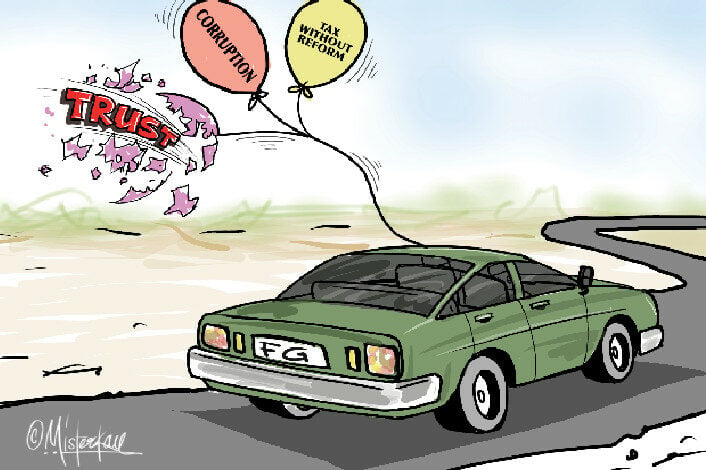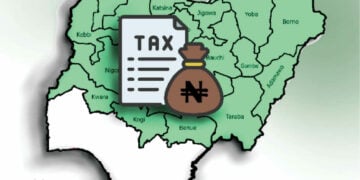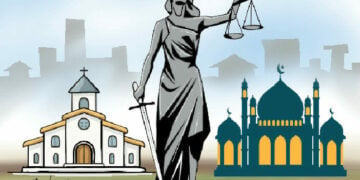Trust is the everyday currency of democratic life. When it drains away, institutions may keep their names and seals, but they lose their weight. The recent Chatham House/NBS findings do not merely offer another set of gloomy numbers; they describe a social contract under strain. Almost half of Nigerians say they “greatly distrust” the police. Roughly a third of the population deeply distrusts the presidency and the federal government. Courts meaning judiciary, local councils, and state politicians also score poorly. Beneath these data points lies a telling paradox: while a majority believe that in their communities, power matters more than honesty, an even larger share still feels bad when others are exploited. In other words, Nigerians have not lost their moral compass; they have lost confidence that integrity is rewarded.
Trust is the quiet architecture that holds a nation together. When it erodes—as it has in Nigeria—it does not simply bruise reputations; it hollows out the very institutions meant to protect, serve, and stabilise society. Courts become venues of suspicion rather than justice, the police a source of fear rather than security, and ministries echo chambers rather than engines of policy. This column has warned about this drift before—”Dearth of Integrity in Public Life” (Nov 2023), “Greed, Ethics, and Public Service in Nigeria” (Jan 2024), “Trust and Economic Recovery” (Nov 2024), “Nigeria Decides 2023: Campaign Promises and the Issue of Trust” (Jan 2023), and “Accountability Deficit and the Transparency Question” (Sept 2023). The core message is simple – governance cannot function effectively without trust.
When Trust in Leadership Fails
This has profound consequences for the presidency. In every constitutional democracy, the presidency is more than an office; it is a symbol of sovereignty, the locus where the authority to govern becomes legitimate in the eyes of citizens. When trust in that symbol erodes, so does the ease with which government can secure compliance, enforce laws, and maintain order. The distance between decree and delivery becomes wider; the cost of governing climbs; every reform meets friction, suspicion, and delay. A president may still command formal power, but the informal consent on which power thrives becomes fragile. What is at stake is not just approval ratings; it is the state’s capacity to act in the public interest without perpetual resistance or doubt. If the centre cannot convincingly demonstrate fairness and results, people begin to conduct their lives outside the state—through private security, informal payments, and parallel services.
Equally troubling is the report’s revelation of a near-consensus that political and economic power now outrank honesty and constitutionally guaranteed rights. When power eclipses principle, democracy becomes performance. Citizens recalibrate their expectations downward, accepting impunity as usual and corruption as inevitable. Over time, this corrodes social cohesion, as people retreat into private coping strategies—such as ethnic solidarities, informal economies, and transactional shortcuts—because public institutions often feel distant, arbitrary, or predatory.
The economy also pays a price. Corruption is not just a moral wrong; it is an efficiency tax that compounds daily. It diverts public resources from classrooms, clinics, and roads. It weakens the rule of law and raises the cost of doing business. Nigeria’s headline GDP invites comparisons with Africa’s largest economies, yet GDP per capita tells a different story about the prosperity felt in households. It is no coincidence that a country battling service-delivery gaps also records stubborn poverty levels. When citizens see budgets without clear outcomes, they tend to disengage. When they are asked to broaden the tax base, they ask a fair question: where does the money go? Trust and tax morale are twins: you cannot raise one while neglecting the other.
The Growing Trust Deficit
The trust deficit did not appear overnight. Nigerians have endured a quarter-century of anti-corruption campaigns whose headlines often outpaced their results. Party loyalty has too frequently trumped public interest; selective enforcement has too usually replaced even-handed justice; and institutional incentives have rewarded survival within a broken system rather than reforming it. The result is reform fatigue: people hear the right words, but they have learned to wait for proof before they believe. Each unfulfilled pledge quietly raises the “cost of honesty”—the risk that playing by the rules leaves one poorer, slower, and excluded—while lowering the “cost of corruption”—the sense that wrongdoing is ordinary, profitable, and rarely punished.
The divide between declarations and reality grows wider when official statements assert that corruption has been eliminated, while everyday experiences and independent data indicate the opposite. Leaders build public trust not by insisting that present hardships will lead to future benefits, but by clearly demonstrating the connection between income and outcomes, and by encouraging external validation. Humility is not a weakness in leadership; it is the precondition for collective effort in hard times. A candid admission—“we are falling short here; here is what we will do by these dates; and here is how you can check”—earns more trust than triumphal claims that do not match reality.
Chatham House Report as a quiet asset
Yet the Chatham House work also surfaces a quiet asset: civic readiness. Nearly half of the respondents believe their communities are willing to monitor public spending on development projects. This is not trivial. Countries that have successfully turned the tide on corruption did not do so through elite willpower alone; they built repeatable, citizen-centred systems that make wrongdoing harder, costlier, and riskier. Nigeria’s opportunity is to shift from exhortation to architecture: empower communities to track projects, publish contracts, and create channels where complaints trigger action. What would a credible reset look like?
An immediate acknowledgement from the presidency that trust is low and that rebuilding it is a national priority. This is not about blame; it is about alignment. A short, time-bound action plan should follow, with dates, owners, and public milestones. In policing, this could mean establishing independent complaints mechanisms that publish their outcomes, rolling out body-worn cameras in high-risk areas, and issuing annual integrity reports that identify trends and outline remedial actions. In procurement, make open contracting the default for all MDAs, and do not award major contracts until the beneficial ownership information is complete and publicly available. In whistleblowing, move beyond slogans: enact robust protections, guarantee anonymity, and demonstrate that serious tips lead to measurable enforcement.
Building Trust: Fair and Measurable Policing
Policing should be fair and measurable. Trust in the police is often formed at the roadside, not in policy documents. Create an independent complaints mechanism with power to investigate, publish findings, and recommend sanctions—then follow through. Roll out body-worn cameras in hotspots with clear policies on usage, retention, and public release after critical incidents. Publish an annual integrity report that tracks complaints by type and outcome, stop-and-search data by location, and disciplinary actions taken. Train for procedural justice—the science that shows people comply when processes are transparent and respectful, even when outcomes are adverse. Pair this with officer protections and incentives so that good policing is safer and more rewarding than rent-seeking.
If we can make taxes visibly become services, make justice measurably quicker and fairer, and make wrongdoing reliably expensive, trust will follow—not as sentiment, but as sense. That is the path out of cynicism: a state that performs in ways citizens can see, test, and believe. And when trust begins to return, it will return as something sturdier than optimism—confidence earned by institutions that work, without drama, in the ordinary rhythm of Nigerian life. The work ahead is to make integrity cheaper than impunity and service more rewarding than cynicism—so our institutions function not as fortresses of power, but as instruments of the common good.





